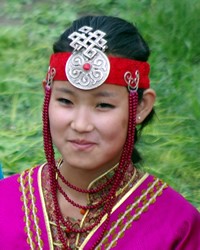The Khalkha Mongols consider their language, Halh, to be the "real" Mongolian language since all other Mongols speak variations or dialects of Halh. Halh is understood throughout Mongolia and by Mongols living in Central Asia. The 13th century was a great time for Mongols, who enjoyed the world's most vast empire for 100 years at the expense of civilizations in Asia and Europe. They were eventually subdued, and in the early 20th century they experimented with a communist government which kept their economy weak. As this government self-destructed in the late 20th century, Mongols faced high levels of unemployment and poverty which they still face today. Those with the means migrated to other countries such as the United States.
In 1949 the first Mongolians began to arrive in the U. S., mainly because of communist unrest in their part of the world. More arrived in the 1990s and 2000s. In 1989, three Mongolian engineering students came to Colorado to study at the Colorado School of Mines. More students followed. By 1996, the University of Colorado's Denver campus had a program aimed specifically at bringing Mongolian students to study in Colorado. There are far more Mongolians in California's San Francisco Bay Area and Greater Los Angeles where they often live in the same neighborhoods as more established Asian immigrants from Vietnam, China and South Korea. There are small Mongolian communities in Arlington, Virginia and Chicago, Illinois as well.
Such the Mongolians are a small community in the U. S. they often intermingle with other Asian groups, especially in California. They have formed the Mongol-American Cultural Association in order to preserve their culture in this foreign land. This association includes similar ethnic groups such as the Buryats and the Kalmyks.
Many are nomads living in herding camps, and migrating seasonably with their animals.
Some Mongolians in the U. S. are marginally Buddhist. A Buddhist temple is a place to meet others, but not necessarily where they go for spiritual growth. The rest are secularized.
The Mongol people in the U. S. need to submit to Jesus Christ so they can experience the abundant life He offers them in John 10:10.
Pray that the Mongol people will have a spiritual hunger that will open their hearts to the King of kings. Pray for workers who are driving by the love and boldness of the Holy Spirit to go to them. Pray for a disciple making movement among them to begin this decade.
Scripture Prayers for the Mongol, Khalka in United States.
| Profile Source: Joshua Project |











